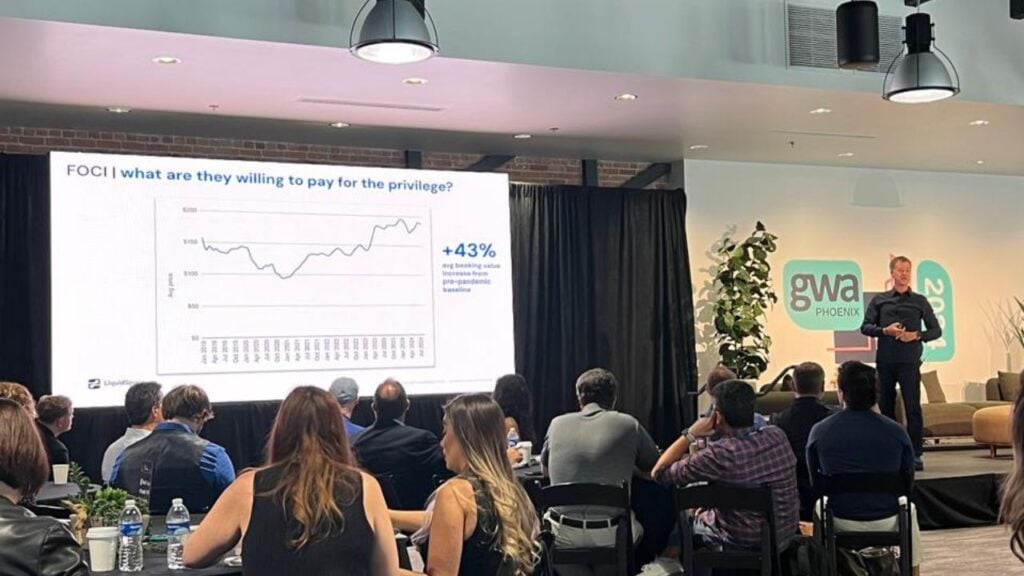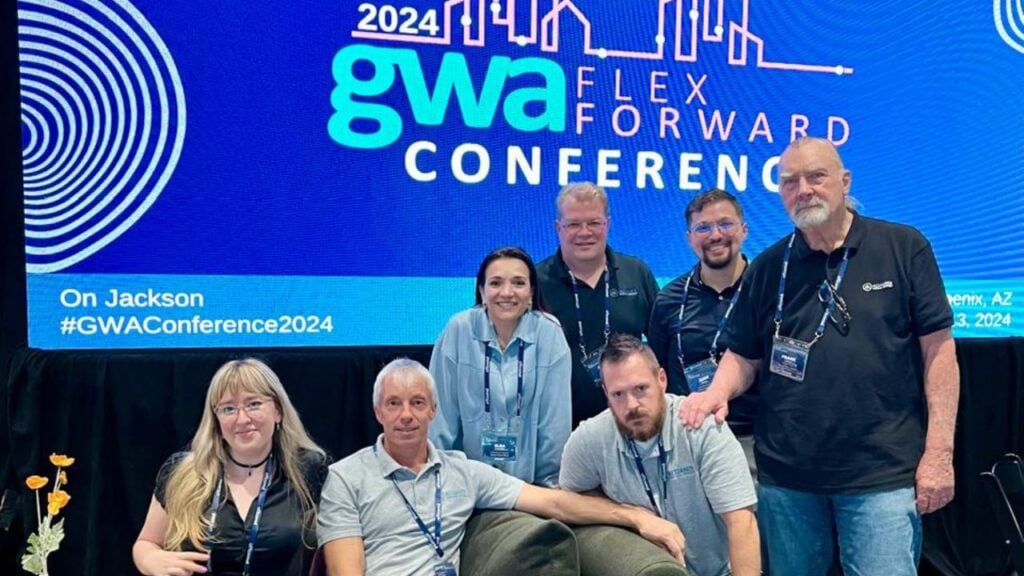- This week, Allwork.Space attended the Global Workspace Association (GWA) conference in Phoenix, Arizona.
- Attendees, including industry giants like Anant Yardi and up-and-coming visionaries, converged to discuss the transformative trends reshaping the flexible workspace sector.
- Amidst the exchange of ideas, one thing was abundantly clear: the future of coworking and flexible workspaces is not just evolving — it’s accelerating toward unprecedented levels of innovation and adaptability.
Allwork.Space attended the 2024 Global Workspace Association (GWA) conference this week in Phoenix, Arizona to bring you the latest coworking industry news and trends.
Attendees, including industry giants like Anant Yardi, and up-and-coming visionaries, converged to discuss the trends transforming the flexible workspace sector. From the nuanced demands for better networking apps to the integral role of aggregators, this year’s conference highlighted the move toward enhanced community, efficiency, and advanced technological integration.
Amidst the exchange of ideas, one thing was abundantly clear: the future of coworking and flexible workspaces is not just evolving — it’s accelerating toward unprecedented levels of innovation and adaptability.
We kept our ears to the ground at the conference, and learned what the trending topics and most pressing issues in the coworking industry are.
1. Coworking spaces need better networking apps
Apparently, the Slack app just doesn’t cut it.
At the conference, David Backman, Managing Partner at St. George Executive Suites, shared with Allwork.Space that he thinks flexible workspace operators need better apps for users to communicate and network with each other.
While some spaces use Slack, there is a need for more dedicated softwares for coworking networking. Community is at the heart of coworking, after all.

2. Aggregators are necessary
An overwhelming sentiment shared at the 2024 GWA Conference was that coworking space and virtual office aggregators are absolutely essential; they are necessary for streamlining access to diverse work environments by consolidating options into a single platform.
This centralization allows businesses and freelancers to efficiently compare and select spaces that meet their specific needs for location, amenities, and budget, without the hassle of searching multiple individual providers.
Aggregators offer flexibility for rapidly scaling businesses — enabling seamless transitions between different workspace arrangements as needs evolve.
By simplifying the decision-making and booking process, aggregators improve operational efficiency and enhance productivity. But not everyone knows that these systems/companies exist.
3. Virtual offices do the marketing for you, and people should know
Companies that offer virtual office services, like Alliance Virtual Office and LiquidSpace, can provide significant advantages for businesses seeking to outsource their marketing efforts, particularly when it comes to securing permanent office space.
Another trend seen at the conference was the rising popularity of virtual offices; by leveraging these platforms, companies can benefit from their established networks and marketing expertise — enabling a broader reach and more effective promotion of available spaces. These platforms ensure higher visibility and credibility, as potential clients can easily access comprehensive listings and professional profiles.
Outsourcing marketing through these services allows businesses to focus on core operations, while still attracting and retaining clients in the competitive real estate market. Essentially — these companies do the marketing for you, and more people, businesses, and entities may want to take advantage of such services. Many are doing just that in order to stay ahead and competitive.
 4. Big companies are finally seeing the appeal of flexible office spaces
4. Big companies are finally seeing the appeal of flexible office spaces
At the conference, LiquidSpace CEO Mark Gilbreath said that huge companies like Amazon, Allstate and T Mobile are allowing some of their workers to choose coworking spaces to work from, rather than the office. In fact, Allstate sold their headquarters and gave employees allowance to choose coworking spaces.
Gilbreath also said the trend is fast moving toward enterprises, and that there are 92% more inquiries of employees asking these big companies to cowork instead of working the office — which shows just how much modern employees are valuing the right to flexibility.
 5. Companies need to understand if they are CMRAs in order to avoid violations
5. Companies need to understand if they are CMRAs in order to avoid violations
During a session on compliance, Carl Swanson, Postal Inspector/Program Manager for the USPS said that $6-9 billion in fraud was due to Commercial Mail Receiving Agencies (CMRAs) during the pandemic. The USPS actually almost got sued by the DOJ due to this, according to Swanson.
“If you receive mail for someone else, you are a CMRA,” Swanson explained during his session at the GWA conference.
Postal managers, coworking spaces, and aggregators need to understand this in future and work to get within compliance.
6. Meeting rooms are becoming more popular
Karen Condi, President of Workspace Strategies, told Allwork.Space at the conference that the main trend she is seeing is that more companies are bringing teams in and developing a hybrid working solution.
“For example, a company may bring 12 employees but only want an office with four desks because the employees will rotate,” she explained. “This has also led to more meeting room revenue because on the days the entire team needs to meet, they need to book a larger room.”
Meeting rooms are becoming more popular as companies transition to hybrid working models, necessitating flexible and adaptable spaces for collaboration and teamwork.
“The most interesting, exciting [change] to me is this idea of the growth of collaboration and meeting rooms. The way that work is changing is probably the most exciting trend that we see,” Ben Wright, Global Head of Partnerships of The Instant Group said during a session.
It’s clear that as businesses transition to hybrid work environments, businesses in the flexible workspace sector are seeing the demand for versatile meeting rooms increase.
Elba Elizondo, Partner Success Supervisor at Alliance Virtual Offices, said during her session that the company is seeing “an increasing trend on the need of coworking spaces; we’ve seen it growing year over year.”
 7. Workers want flexible workspaces anywhere and everywhere
7. Workers want flexible workspaces anywhere and everywhere
President and Founder of Yardi Systems Anant Yardi, the most esteemed coworking industry speaker at the 2024 GWA Conference, said during his keynote session that his company has seen steady 26% year-over-year growth — highlighting just how popular the industry is getting.
“Workplace is focused on how a corporate employee can book space any place in the world. I like to say that the two key concepts — which I think will take hold — are space anywhere, and flex everywhere,” Yardi said. “So to all of our commercial clients, we’re saying, ‘like it or not, all the major buildings will have flex space,’ and it will be beneficial, not just to the building, but to the traditional leased spaces.”
8. More advanced workspace design is on the rise
At the coworking conference, there was a notable trend toward more sophisticated and personalized workspace designs.
“Coworking is truly becoming like a lifestyle,” said Belle Morales, VP of Business Development at The Sliding Door Co.
This shift is reflected in the introduction of new customizations in workspace elements.
Due to new desires from users, The Sliding Door Co recently integrated Smart Lock technology in both swing doors and wall slides, providing enhanced security and convenience. This highlights the trend towards blending functional innovation with advanced, modern design in coworking environments.
9. Coworking operators are starting to integrate AI
Coworking operators are increasingly integrating AI to streamline and enhance their business operations, and this integration primarily focuses on automating and optimizing sales and customer service processes.
“It’s an enhancement, not a replacement,” said Rhonda Gazaway, Executive Director of Sales at Expansive during the AI Innovations in Coworking session.
AI agents, much like new sales hires, are trained on product portfolios, pricing, FAQs, and customer service protocols. They handle everything from responding to inquiries, booking tours, and escalating complex issues to human specialists when necessary.
This approach has led to significant improvements in conversion rates and operational efficiency, as these AI-powered systems can manage leads and customer interactions around the clock without breaks.
The AI systems are continuously refined based on feedback, ensuring they become more effective over time.
According to the panelists at the conference, this partnership with AI doesn’t replace human staff but rather enhances their capabilities, allowing them to focus on more complex and personalized interactions with clients.
With the successful deployment of AI in coworking spaces across numerous locations, operators are witnessing a notable return on investment and are poised to expand these technologies further.
 10. Operators are valuing data for coworking success
10. Operators are valuing data for coworking success
Operators in the coworking industry are starting to increasingly value data for ensuring success, focusing on metrics like utilization, occupancy, and customer engagement. By leveraging big data analytics, they optimize service offerings, from pricing and membership plans to user experience and space design.
Data aggregation into structures like data lakes reveals patterns and trends, helping with dynamic pricing and identifying popular products, such as day passes or meeting rooms.
Some platforms track user flow, booking times, and preferences — converting occasional users into regular visitors. Utilization metrics identify underused areas and peak times, guiding space management.
Customer satisfaction is assessed through feedback, NPS scores, and social media engagement, influencing space design and marketing based on trends like same-day bookings or demand for mid-sized meeting rooms, according to the panel on harnessing data for coworking success at GWA.
Overall, data-driven strategies enhance user experience, security, and financial performance.


















